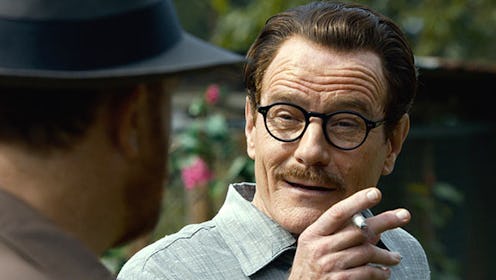
In the new film Trumbo, Bryan Cranston portrays Dalton Trumbo, one of the top screenwriters in Hollywood in the 1940s. But Trumbo is also a communist, which, clearly, was a bad thing to be in post-WWII America. In the movie, which is based on a true story, Trumbo and several other members of the film and arts industries are blacklisted for their political beliefs, left unable to find work. Trumbo and nine others even serve jail time for contempt after they refuse to testify before Congress's House Un-American Activities Committee, which was investigating possible communist ties in Hollywood. The jailed group became known as the Hollywood Ten, and their brave stance in the face of harsh treatment still stands as a symbol of perseverance and determination. But just who were the Hollywood Ten of Trumbo ?
In addition to the aforementioned Trumbo, the rest of the Hollywood Ten were made up of screenwriters or directors in their own right. And while they may not have achieved the success that Trumbo did (he wrote Spartacus and two of his scripts won Oscars while he was blacklisted), or even all be featured in the movie, their contributions to the film industry should not be overlooked. So here's who they were.
Alvah Bessie
Bessie was a novelist who had a short career as a screenwriter due to his being blacklisted. Despite his small body of work, though, he still managed to snag an Oscar nomination for coming up with the story for the 1945 war film Objective, Burma!
Herbert Biberman
Biberman wrote several films before being blacklisted, but his most-memorable achievement actually came after his experience as a member of the Hollywood Ten. He directed 1954's Salt of the Earth, which was written and produced by fellow blacklisters. The film pushed feminist, socialist, and pro-Mexican American viewpoints, and was harshly criticized as propaganda by the communist-crazed Hollywood press of the time. It's become far more well-regarded in recent times, and was added to the Library of Congress' National Film Registry in 1992, preserving it for all time.
Lester Cole
Cole wrote over 40 films prior to being blacklisted, and only managed to get three films made afterward (all under false names). But his greatest contribution may be related to the rights of screenwriters, as he helped unionize them by co-founding the Writers Guild of America in 1933.
Edward Dmytryk
Dmytryk was a director, and a good one at that. He won the Oscar for Best Director in 1947 for Crossfire, and was then blacklisted later that year. Unlike most of the rest of the Hollywood Ten, however, Dmytryk was able to salvage his career by testifying before congress about communism in 1951. He then went on to direct his biggest hit, The Caine Mutiny, which was nominated for a Best Picture Oscar in 1955.
Ring Lardner, Jr.
An accomplished screenwriter, Lardner won his first Oscar in 1942 for writing Woman of the Year, and again in 1970 for penning M.A.S.H. during his post-blacklist comeback.
John Howard Lawson
Lawson was the first president of the Screenwriters Guild of America, West when the organization split into east and west divisions. He was also a prolific writer, producing numerous plays and films, including the Humphrey Bogart-starring Sahara.
Albert Maltz
Screenwriter Maltz went nearly two full decades without finding work in the industry after being blacklisted, despite an abandoned effort by Frank Sinatra to go against the blacklist in 1960 by hiring him. Maltz finally returned to work in 1970 by writing the Clint Eastwood/Shirley MacLaine film, Two Mules For Sister Sara.
Samuel Ornitz
Along with Cole and Lawson, writer Ornitz had a hand in unionizing Hollywood's writers. He was also a novelist, and wrote the bestseller Bride of the Sabbath in 1951.
Adrian Scott
Scott was Dmytryk's go to producer, and worked with the director on several films before they were blacklisted together, including the Oscar-winning Crossfire. When he was unable to find work after his Hollywood Ten jailing, he wrote under a false name for the British television show The Adventures of Robin Hood.
The way the Hollywood Ten were treated just because of their political beliefs is certainly a sore spot for Hollywood, but thankfully they all managed to find some success and redemption in the years that followed. And though they're not the focus of Trumbo, their message of defiance in the face of injustice lives on.
Images: Bleecker Street; Warner Bros.; Organa; Writers Guild of America, West; Columbia Pictures; 20th Century Fox; Universal Pictures; Amazon; ITC Entertainment